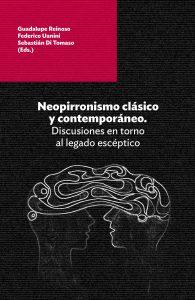Classical and contemporary neopyrrhonism. Neopyrrhonism is a philosophical doctrine that denies the possibility of certain knowledge.: Discussions surrounding the skeptical legacy
Keywords:
philosophy, skepticismSynopsis
This e-book, edited by Guadalupe Reinoso, Federico Uanini, and Sebastián Di Tomaso, consists of a selection of nine articles that explore the legacy of classical Pyrrhonism in late antiquity, in modern and contemporary authors, as well as in the exploration of a current neo-Pyrrhonian proposal.
Chapters
-
Introduction: The Legacy of Pyrrhonian Skepticism
-
Contemporary Neopyrrhonism: a performative proposal
-
The concept of ἀγωγή in Sexto Empírico and its innovation in tradition
-
Pyrrhonic presence in Montaigne: zethesis, good use of judgment, and humanism
-
Pyrrhonism and criticism: a neo-Pyrrhonian reading of F. Mauthner's Sprachkritik
-
From historical materialism to skeptical historiography (and vice versa)
-
Pyrrhonic passions: pathos and metriopathia from Sextus Empiricus to Martha Nussbaum
-
An ethical-practical approach to a neo-cynic way of lifeovercoming the controversy between rural and urban dwellers
-
Why be a skeptic? An analysis of “skeptical privilege” in David Hume's problem of personal identity
-
Pyrrhonism in Blaise Pascal's wager argument

Downloads
Published
September 20, 2024
Series
Categories
Copyright (c) 2024 Guadalupe Reinoso, Federico Uanini, Sebastián Di Tomaso; Tristán Fita, Rodrigo Pinto de Brito, Ciro Botta, Soledad Massó, Rocío Herrera, Alison Caceres
License

This work is licensed under a Creative Commons Attribution-NonCommercial-ShareAlike 4.0 International License.
Details about this monograph
ISBN-13 (15)
978-950-33-1817-1


